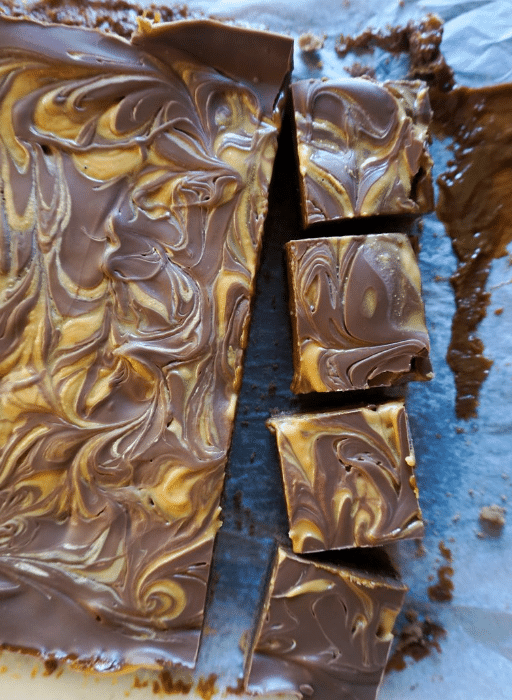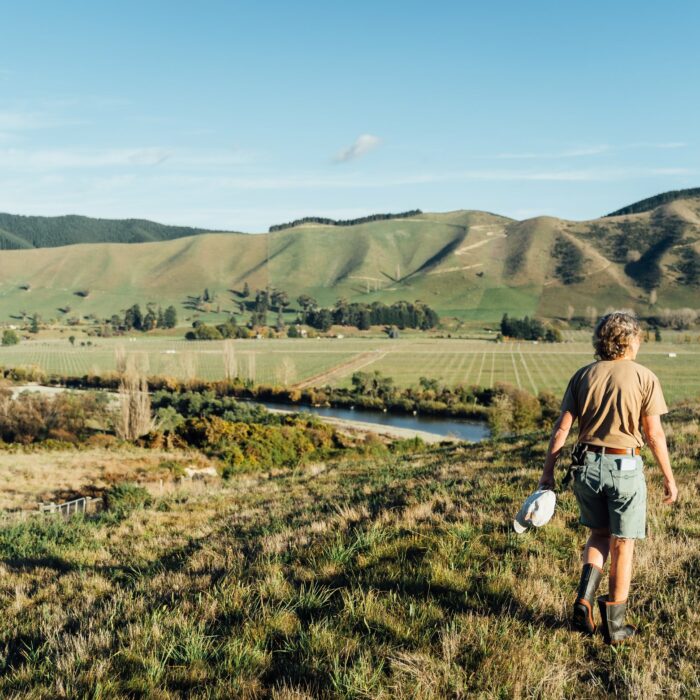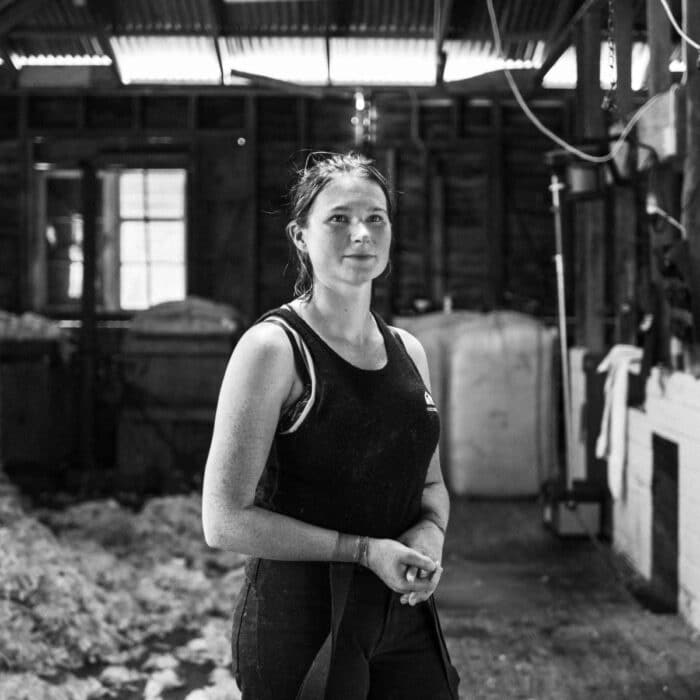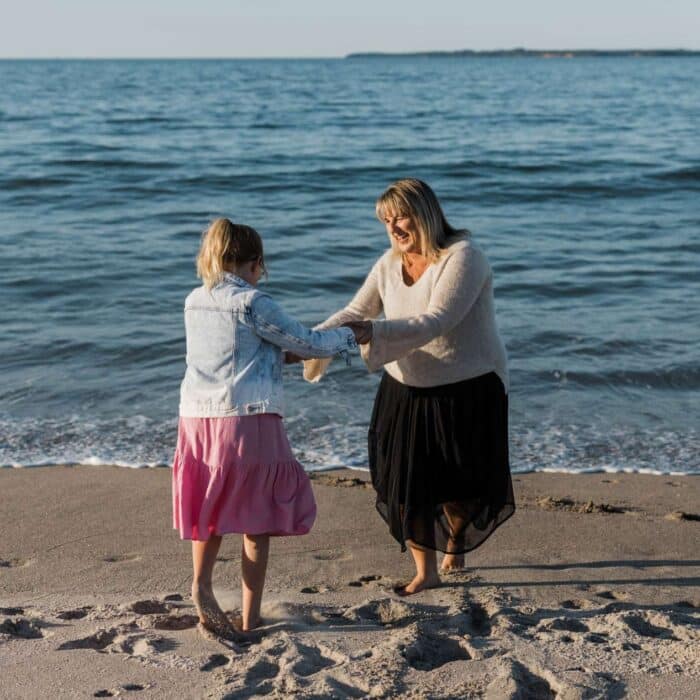11 September 2022
Hunter, Teacher, Mother, Wahine Toa
Kei Te Taiao. Local Legends.
writer: ANNA BRANKIN (KĀI TAHU, KĀTI MĀMOE)
photographer: claire mossong
When Tui Keenan discovered hunting four years ago, she had an epiphany – she was a wahine toa, and proud to be Māori. It changed her life, and she now shares her passion with her community.

Tui with the Kura whānau preparing Kai Ora boxes to be delivered to whānau. From front left, Nanny Tira Nathan, Taurren Kupenga-Tamarama, Mana Biddle-Nepia, Hiria Whati-Haapu, Nanny Mere Teepa. In the back row Tui, Kiki Wilson and Māmā Karol Johnson.
Readers may be familiar with Tui from her popular Māori Television show Hunting with Tui, which followed her journey of reconnecting with her heritage through learning to hunt. Today, she draws on the skills and knowledge gained during that experience to help whānau develop resiliency, self-sufficiency and a connection with te ao Māori.
“When I shot my first deer, straightaway it was that sense of connection, like wow, I’ve been created to do this,” says Tui, 43. “My tūpuna were renowned for their ancient customs of gathering kai and now I’m part of it.”
Nowdays, Tui is fostering that connection within the community of Te Kura Reo Rua o Waikirikiri, the bilingual primary school in Gisborne where she works as a well-being whānau worker and school counsellor. She came across the role shortly after wrapping Hunting with Tui, when she was looking for a way to put her newfound knowledge to work for her community. “There was an ad in the paper for a well-being teacher, and I could tick every box except I wasn’t a qualified teacher,” Tui says. “I didn’t get that job but they created a role for me, to work with whānau as part of the well-being team. I don’t have a job description – I find solutions to barriers that our families are facing, and my role is to connect families to who they are.”
Tamariki of Te Kura Reo Rua o Waikirikiri. "I think my whole journey since I was a kid has brought me to where I am today, working at the school with no job description and no boundaries. I love working in the grey area to try and get the best for our families," Tui says.
This can look like anything from spending one-on-one time with tamariki making preserves using produce from the school garden to taking whānau groups into the bush and teaching them about te Māori and traditional food-gathering practices.
"We are surrounded by hunting and fishing galore in Gisborne, but almost everyone in that school is exactly how I was: urbanised Māori, disconnected from their marae, only go there for tangi," says Tui. "It's being able to share my experience, and to help them see things through a te ao Māori lens. Sometimes it's as simple as putting a message out on Facebook saying, 'If you're interested in learning how to skin and cut up a deer and take some meat home, come on down.' And when you're introducing people to that experience you can see that shift in them - you're connecting them with Tāne, with Papatūānuku, with their food source."
Tui is passionate about helping whānau to improve their relationship with kai and lead healthier lifestyles, and this is what led to the creation of the Kai Ora programme within the school - another way that she is using her role to create bespoke solutions for the challenges whānau experience.
"I found that a lot of families are struggling with finances and food. I'm a firm believer in giving a hand up, not a handout, so we started this food subscription service in partnership with another community group, Huringa Pai," Tui explains. "Whānau pay $10 a week and they receive a delivery of pantry staples, fresh veggies and a meal plan. They also receive a donation of MPI-certified venison from our food bank."
The food bank is another initiative that encourages a collective approach to gathering kai and supporting the community: local farmers and hunters can donate deer. "If they can't skin it, that's fine," Tui says. "I'll pick it up, put it in the chiller and a few days later I'll take it to school and get the kids and parents involved. They take real pride in restocking the food-bank freezers."
"When I take families into the bush I know that they come out changed for the better. It's something you can't get from a text book, you can't document it on film. You just have to be there firsthand."

Supporting the whānau of Te Kura Reo Rua o Waikirikiri - most of whom have whakapapa to local iwi - is enormously satisfying for Tui, who has been through her own journey of reconnection and reclamation over the past five years. Although she is of Ngāti Porou descent, she grew up in Ōtautahi in the midst of her father's Pākehā family - an upbringing she describes as beautiful and loving, but one that left her disconnected from her true identity.
"Mum made the decision very early to leave the East Coast and that she wasn't going to pass on te ao Māori ways to us. Her father had taught her that it was best to live in te ao Pākehā so that's what she wanted for her children," Tui explains. "It meant I grew up believing a lot of lies - that Māori culture and stories were evil, that the marae is a bad place."
These lies became internalised, and Tui carried them with her into adulthood. She joined the navy and then the police force, moving to Gisborne at the age of twenty-two but not yet ready to reconnect with her heritage. "I'd quite often find myself driving through the gorge or up the coast, but I was never aware that I was driving through the bush, or that Tangaroa was right there," Tui reflects.
Tui left the police force after eight years. "I didn't realise how damaged I got as a cop because I could never help these families. It was always one job to the next to the next, and you're supposed to forget about the crying kids," she says. "Now I'm no longer turning my back on these families, so I think it's really healing for me." Initially she worked in the health and fitness industry, where she found herself able to make a difference for whānau by improving their wellbeing through exercise and nutrition, planting a seed for the work she does today.
The Kai Ora food boxes are filled with the MPI-certified venison from the school's food bank, and other staples. "Hikurangi is the maunga for the school, and we get a lot of our venison from there. So the mountain that has sustained these deer, now sustains our whānau. Even though a lot of them have never been to their maunga, they're connected to it in that way."
However, it was her decision to learn to hunt to spend more time with her husband Comrie that led to the transformative experience that set her on a new path. After posting about her hunting journey on Facebook, she was approached about creating Hunting with Tui for Māori Television. For the very first episode, the crew took her up Hikurangi, her ancestral maunga and a place she had never visited. She knew this would be an important step in her journey but she had no idea just how meaningful it would turn out to be.
"Suddenly I felt my grandfather quite close to me, and I felt he was saying that he was really proud of me," Tui recalls. "It's hard to articulate but it was like all of the lies I had been made to believe suddenly exploded and I could see myself for the very first time. It felt like I became a born-again wahine Māori and now I'm living in the best of both worlds - te ao Māori and te ao Pākehā."
Since that moment, Tui has been on a constant path of growth and learning, and she is determined to bring other whānau with her. "When I take families into the bush I know that they come out changed for the better. It's something you can't get from a textbook, you can't document it on film. You just have to be there firsthand." Within her own whānau, Tui is proud of the legacy that she's creating for her five daughters. "What I love the most is that they already know who they are as Māori, as wāhine," she says. "I was thirty-nine when I stepped into my true identity and I just love that they've gotten it so much earlier."
Glossary. Iwi, tribal grouping. Kai, food. Kōkā, respectful term for a woman. Kura, school. Marae, customary gathering place. Maunga, mountain. Papatūānuku, earth mother. Ōtautahi, Christchurch. Tāne (mahuta), the origin and guardian of the forest and its beings. Tangaroa, the origin and guardian of all creatures within the ocean. Tangi, funeral (the weeping of tears). Te ao, the world. Tūpuna, ancestors. Wahine toa, strong woman. Wairua, spirit. Whakapapa, genealogy. Whānau, families.



This story is part of THREAD, a year-long project by Shepherdess made possible thanks to the Public Interest Journalism Fund through NZ On Air.
If you enjoyed this story, please share with someone else.
This story appeared in the Kōanga Spring 2022 Edition of Shepherdess.
Get your hands on a copy.
Related Stories
Going with the Flow
When community members share success stories, trade best practices and encourage others in protecting the health of their river, sustainability actions become more than a sum of their parts.



